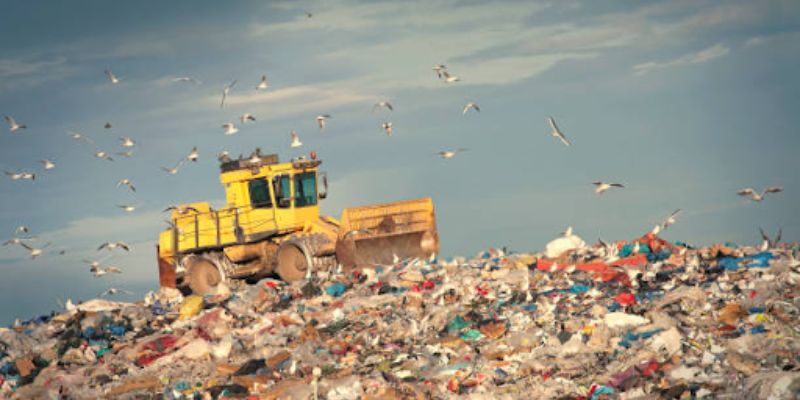Are you sick of our waterways being contaminated & the streets being cluttered with trash? Are you interested in finding out how to safeguard our world from dangerous waste goods? Waste disposal solutions are the answer! We can contribute to pollution reduction and environmental protection by practising efficient waste disposal techniques, or get somebody from Skip Hire Parbold to do it. In this blog article, we shall examine the operation of waste management technologies and their contribution to a less polluted, healthier planet. Let’s get started!
Overview of Waste Management Systems
Solid waste may be collected, processed, & disposed of effectively with the help of systems for waste management. By keeping pollutants out of the air, water, as well as soil, they contribute to pollution reduction as well as environmental protection. Waste reduction, recycling, composting, incineration, as well as landfills are just a few of the technologies and methods that can be used in systems for managing waste. The optimal option for a given town will rely on a variety of criteria, such as the kind and volume of trash produced, local facilities and assets, and environmental legislation.
Every one of these approaches has pros and cons of its own. The efficient operation of waste management depends on implementing each level of solid waste control beginning with reduction and ending in disposal. Our landfills will experience less pressure while treatment facilities require less operation through initial waste generation reductions. When we maintain resources and energy and refrain from releasing toxic substances into our environment through recycling or reusing objects we avoid disposal.
How Can Public Health Be Improved by Effective Waste Management?
There is complete clarity about how poor waste management practices create severe health risks for people. The significance of waste management becomes essential for all people combined including their homes and businesses, during recycling activities. Recycling materials in the correct manner results in a substantial reduction of personal safety threats that stem from air and water contamination. The demand reduction reduces pollution by diminishing both material extraction and processing activities that harm our natural resources, while the recycling process maintains those resources safe from harmful chemical pollution. The proper management of waste by expert firms ensures businesses can minimize bug infestations alongside other hazards.
Reducing Environmental Pollution Together with Landfill Waste Creation Represents a Major Solution
Landfill waste reduction stands as the primary method through which environmental damage decreases from waste management operations. Various dangerous gases such as carbon dioxide and methane escape from landfills, which makes them a leading cause of pollution and climate change. The absorption of hazardous waste substances into groundwater and soil threatens both human wellness and adversely affects the environment. The practice of recycling, together with composting and waste separation techniques, minimizes the amount of landfill waste and decreases its harmful impact on the environment.
Encouraging Resource Conservation and Recycling
Survival of Earth’s resources depends on waste management’s fundamental recycling system. The practice of recycling metals together with glass and plastic, and paper decreases the need to excavate fundamental substance elements. Environmental deterioration results mainly from mining operations and forest destruction, and production procedures which demand high amounts of water. The practice of recycling waste helps decrease environmental resource extraction and minimizes both energy consumption and pollution levels. Participation of businesses and families in recycling programs helps develop the cyclic resource management model that keeps materials in ongoing use.
Reducing Water and Air Pollution
Substantial air and water contamination results from incorrect waste disposal. Toxic gases, such as dioxins & particulate matter, are released when garbage is burned outside and pose a threat to both the environment and the health of humans. Waste also disturbs aquatic life as well as pollutes sources of drinking water when it is disposed of in water bodies. Pollution concerns are greatly decreased by proper waste management, which includes waste-to-energy technology, restricted landfill sites, and strictly controlled incineration. The preservation of the quality of the water and air for future generations is ensured by implementing stringent waste disposal regulations.
Encouraging the Production of Sustainable Energy
images from waste inputs convert into practical energy that enables sustainable power generation. Energy production through landfill gas capture methods and anaerobic digestion, and incineration with energy recovery systems lowers dependence on fossil fuels. Biogas represents a renewable energy source which can be produced through converting both food waste and agricultural waste into energy. The combination of reduced greenhouse gases with sustainable development becomes feasible since waste reduction leads to sustainable energy alternatives.
Conclusion
Managing waste effectively serves to decrease environmental ruin while protecting our planet. Activities managing waste lead to environmental improvement by enabling recycling practices as well as reducing pollution levels and decreasing landfill sites and encouraging renewable power generation in addition to active consumer responsibility. Waste management deployment needs governmental support together with corporate and individual action toward sustainable development.
Read more : SWGOH Webstore: An Essential Hub for Star Wars: Galaxy of Heroes Enthusiasts


